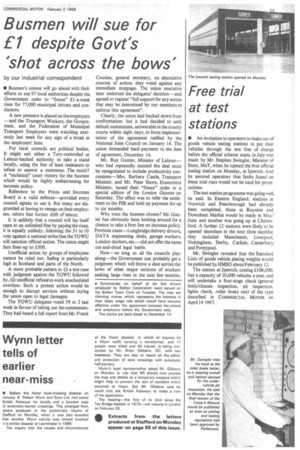Busmen will sue for £1 despite Govt's 'shot across the bows'
Page 57

If you've noticed an error in this article please click here to report it so we can fix it.
by our Industrial correspondent • Busmen's unions will go ahead with their efforts to sue 97 local authorities despite the Government order to "freeze" £1-a-week rises for 77,000 municipal drivers and conductors.
A new pressure is placed on the employers —and the Transport Workers, the Govern ment, and the Federation of Municipal Transport Employers were watching anxiously last week for any sign of a break in the employers' lines.
For local councils are political bodies. It might suit either a Tory-controlled or Labour-backed authority to take a stand locally, using the line of least resistance to refuse to answer a summons. The result?
A "technical" court victory for the busmen which would be highly embarrassing for incomes policy.
Reference to the Prices and Incomes Board is a valid defence—provided every council agrees to use it. But many are disgruntled at having to renege on their employees, others fear further drift of labour.
It is unlikely that a council will lay itself open to an unlimited fine by paying the rises; it is equally unlikely, following the 51 to 10 vote against a national strike that the TGWU will sanction official action. The union might face fines tip to £500.
Unofficial action by groups of employees cannot be ruled out: feeling is particularly high in Scotland and parts of the North.
A more probable pattern is: (i) a test case with judgment against the TGWU followed
by, 0 unofficial refusal to work unscheduled overtime. Such a protest action would be enough to disrupt services without laying the union open to legal damages.
The TGWU delegates voted 59 to 2 last week in favour of taking out the summonses. They Mcl heard a full report from Mr. Frank Cousins, general secretary, on alternative courses of action; they voted against any immediate stoppage. The union executive later endorsed the delegates' decision—and agreed to register "full support for any action that may be determined by our members to enforce this agreement".
Clearly, the union had backed down from confrontation: but it had decided to seek default summonses, answerable in the county courts within eight days, to force implementation of the agreement ratified by the National Joint Council on January 14. The union demanded back-payment to the date of agreement, December 14.
Mr. Ray Gunter, Minister of Labour— who had repeatedly insisted the deal must be renegotiated to include productivity concessions—Mrs. Barbara Castle, Transport Minister, and Mr. Peter Shore, Economics Minister, issued their "freeze" order in a special edition of the London Gazette on Saturday. The effect was to refer the settlement to the PIB and hold up payment for up to six months.
Why were the busmen chosen? Mr. Gunter has obviously been looking around for a chance to take a firm line on incomes policy. Previous cases—Longbridge delivery drivers, DATA engineering deals, garage workers, London dockers, etc.—did not offer the same cut-and-dried legal battle.
Now—so long as all the councils play along—the Government can probably get a judgment which will throw a shot across the bows of other major sections of workers seeking large rises in the next few months.




































































































































































































